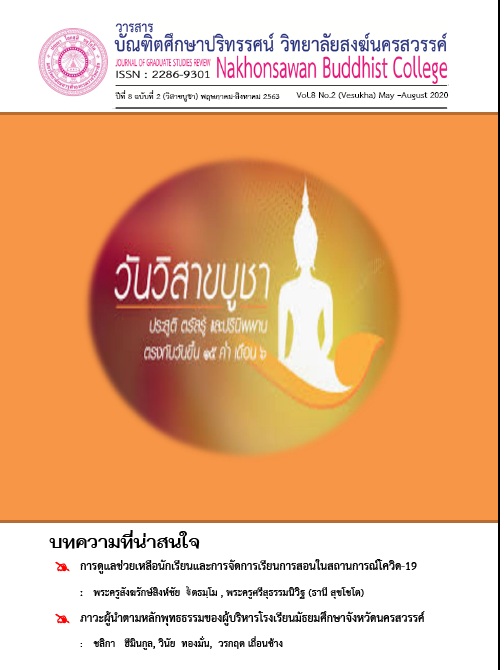The Satisfaction of Parents to the Service According to the Sangahavatthu 4 At NakhonSawan Special Education Center
Main Article Content
Abstract
The objectives of the research were: 1) to study the satisfaction of parents to the service according to the Sangahavatthu 4(principles of kindly treatment) at NakhonSawan Special Education Center, 2) to compare the level of the satisfaction of parents to the service according to the Sangahavatthu 4 at NakhonSawan Special Education Center classified by personal factors, and 3) to present the guideline for the development and the suggestion for the service according to the Sangahavatthu 4 at NakhonSawan Special Education Center. This research was Descriptive Research consisting of Quantitative Research and Qualitative Research. The sample of the research consisted of 157 parents. The analysis of data used Statistical Package for Social Science. The tools of the research were the questionnaire and Structured Interview from 5 Key Informants. The statistics used Frequency, Percentage, Mean, Standard Deviation, t-test, F-test with One Way ANOVA and Least Significant Difference: LSD., and the Content Analysis.
Results of the research
Overall, the satisfaction of parents to the service according to the Sangahavatthu 4 at NakhonSawan Special Education Center in 7 aspects : 1) collecting the general information of the special children according to the Sangahavatthu 4, 2) screening the types of learning disabilitiesaccording to the Sangahavatthu 4, 3) evaluating the basic abilities according to the Sangahavatthu 4, 4) planning for the service and helping the special families and the personal educational management plan according to the Sangahavatthu 4, 5) serving with the activities suitable according to the Sangahavatthu 4, 6) evaluating the progress according to the Sangahavatthu 4, and 7) supervising, monitoring, evaluating and transmitting according to the Sangahavatthu 4 wasas at the middle level. When considering each aspect, it found that evaluating the basic abilities according to the Sangahavatthu 4was at the highest level. However,collecting the general information of the special children according to the Sangahavatthu 4 was at the lowest level.
The guideline for the development and the suggestion for the service according to the Sangahavatthu 4 at NakhonSawan Special Education Center found that:1) for collecting the general information of the special children according to the Sangahavatthu 4, the center should provide the training in giving the knowledge about the special children in the area, 2) for screening the types of learning disabilities according to the Sangahavatthu 4, the center should provide the training for the related people or teachers to get the proper knowledge and understanding in using the screening test, the screening process and the transmission, 3) for evaluating the basic abilities according to the Sangahavatthu 4, the center should provide the experts in evaluating the basic abilities of the special children with many evaluations per a person to the proper evaluation results, 4) for planning for the service and helping the special families and the personal educational management plan according to the Sangahavatthu 4, the center should make the plan for serving and helping with the cooperation of the other organizations, 5) for serving with the activities suitable according to the Sangahavatthu 4, the center should provide the activities with the communities for learning the experiences of the special children to develop the special children for living in the society, 6) for evaluating the progress according to the Sangahavatthu 4, the center should make the information for the progress evaluation carefully to apply the information on time, and 7) for supervising, monitoring, evaluating and transmitting according to the Sangahavatthu 4, the center should provide the teachers for visiting the special children to know their lives.


